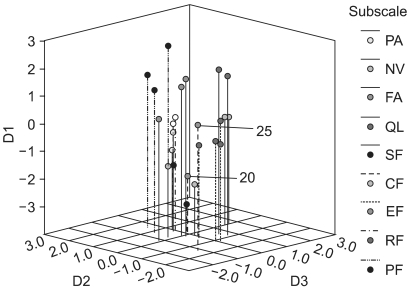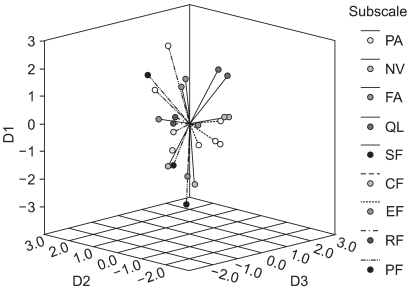Cancer Res Treat.
2005 Jun;37(3):148-156.
Multidimensional Constructs of the EORTC Quality of Life Questionnaire (QLQ-C30) in Korean Cancer Patients with Heterogeneous Diagnoses
- Affiliations
-
- 1Graduate School of Public Health, Ajou University, Korea. ehlee@ajou.ac.kr
- 2Radiation Oncology, Ajou University Hospital, Republic of Korea.
- 3General Surgery, Ajou University Hospital, Republic of Korea.
- 4Medical Oncology, Ajou University Hospital, Republic of Korea.
Abstract
- PURPOSE
The aim of this study was to evaluate the multidimensional constructs of the EORTC Quality of Life Questionnaire (QLQ-C30) in patients with cancer, employing not only the commonly used multitrait scaling analysis and interscale correlations, but also the factorial and multidimensional scaling (MDS) analyses. MATERIALS AND METHODS: A total of 334 Korean cancer patients participated in this cross-sectional study. All patients completed the QLQ-C30. RESULTS: With the multitrait scaling analysis, the cognitive functioning scale did not meet item convergent and divergent validities. With the interscale correlations, the physical and role functioning scales were found to be highly correlated; this was also evident in the factorial analysis. The MDS showed that each item within the social, emotional, global health status/quality of life, and nausea/ vomiting scales were clustered close together, but far from those of the other scales. CONCLUSION: The authors conclude that the four way evaluation of the QLQ-C30 produced results that supported the original hypothesized constructs. However, the physical and role functioning scales were not distinctive, and that of the cognitive functioning was somewhat problematic in the Korean population with cancer.
MeSH Terms
Figure
Reference
-
1. Bjordal K, Kaasa S. Psychometric validation of the EORTC Core Quality of Life Questionnaire, 30-item version and a diagnosis-specific module for head and neck cancer patients. Acta Oncol. 1992; 31:311–321. PMID: 1622651.
Article2. Aaronson NK, Ahmedzai S, Bergman B, Bullinger M, Cull A, Duez NJ, et al. The European organization for research and treatment of cancer QLQ-C30: A quality-of-life instrument for use in international clinical trial in oncology. J Natl Cancer Inst. 1993; 85:365–376. PMID: 8433390.3. Kobayashi K, Takeda F, Teramukai S, Gotoh I, Sakai H, Yoneda S, et al. A cross-validation of the European organization for research and treatment of cancer QLQ-C30 (EORTC QLQ-C30) for Japanese with lung cancer. Eur J Cancer. 1998; 34:810–815. PMID: 9797690.
Article4. Kaasa S, Bjordal K, Aaronson N, Moum T, Wist E, Hagen S, et al. The EORTC core quality of life questionnaire (QLQ-C30): validity and reliability when analyzed with patients treated with palliative radiotherapy. Eur J Cancer. 1995; 31A:2260–2263. PMID: 8652253.5. Nunnally JC, Bernstein IH. Psychometric theory. 1994. 3rd ed. New York: McGraw-Hill.6. Ware JE Jr, Gandek B. Methods for testing data quality, scaling assumptions, and reliability: the IQOLA project approach. International Quality of Life Assessment. J Clin Epidemiol. 1998; 51:945–952. PMID: 9817111.7. Kemmler G, Holzner B, Kopp M, Dunser M, Greil R, Hahn E, et al. Multidimensional scaling as a tool for analysing quality of life data. Qual Life Res. 2002; 11:223–233. PMID: 12074260.8. Gable RK. Instrument development in the affective domain. 1986. Boston: Kluwer-Nijhoff.9. Osoba D, Zee B, Pater J, Warr D, Kaizer L, Latreille J. Psychometric properties and responsiveness of the EORTC quality of life questionnaire (QLQ-C30) in patients with breast, ovarian and lung cancer. Qual Life Res. 1994; 3:353–364. PMID: 7841968.
Article10. Kaiser HF. An index of factorial simplicity. Psychometrika. 1974; 39:31–36.
Article11. Tabachnick BG, Fidell LS. Using multivariate statistics. 1996. 3rd ed. New York: Harper Collins;p. 635–708.12. Stevens J. Applied multivariate statistics for the social sciences. 1986. Hillsdale, NJ: Lawrence Erlbaum Associates.13. Streiner DL, Norman GR. Health measurement scales. 2003. Oxford: New York:14. Zhao H, Kanda K. Translation and validation of the standard Chinese version of the EORTC QLQ-C30. Qual Life Res. 2000; 9:129–137. PMID: 10983477.15. Aaronson NK, Bullinger M, Ahmedzai S. A modular approach to quality-of-life assessment in cancer clinical trials. Recent Results Cancer Res. 1988; 111:231–249. PMID: 2459750.
Article16. Ringdal GI, Ringdal K. Testing the EORTC quality of life questionnaire on cancer patients with heterogeneous diagnoses. Qual Life Res. 1993; 2:129–140. PMID: 8518767.
Article17. Kemmler G, Holzner B, Kopp M, Dunser M, Margreiter R, Greil R, et al. Comparison of two quality of life instruments for cancer patients: the functional assessment of cancer therapy-general and the European Organization for Research and Treatment of Cancer Quality of Life Questionnaire-C30. J Clin Oncol. 1999; 17:2932–2940. PMID: 10561373.18. McLachlan SA, Devins GM, Goodwin PJ. Factor analysis of the psychosocial items of the EORTC QLQ-C30 in metastatic breast cancer patients participating in a psychosocial intervention study. Qual Life Res. 1999; 8:311–317. PMID: 10472163.19. Ferrell BR, Dow KH, Leigh S, Ly J, Gulasekaram P. Quality of life in long-term cancer survivors. Oncol Nurs Forum. 1995; 22:915–922. PMID: 7567610.20. Fayers PM, Machin D. Quality of life: assessment, analysis and interpretation. 2001. West Sussex, UK: Wiley.21. Luo N, Fones CSL, Lim SE, Xie F, Thumboo J, Li SC. The European organization for research and treatment of cancer quality of life questionnaire (EORTC QLQ-C30): validation of english version in singapore. Qual Life Res. 2005; 14:1181–1186. PMID: 16041912.
Article22. Guzelant A, Goksel T, Ozkok S, Tasbakan S, Aysan T, Bottomley A. The European organization for research and treatment of cancer QLQ-C30: an examination into the culture validity and reliability of the Turkish version of the EORTC QLQ-C30. Eur J Cancer Care. 2004; 13:135–144.
- Full Text Links
- Actions
-
Cited
- CITED
-
- Close
- Share
- Similar articles
-
- Effects of a 4-Week Multimodal Rehabilitation Program on Quality of Life, Cardiopulmonary Function, and Fatigue in Breast Cancer Patients
- Influence of Urinary Dysfunction on Quality of Life in Women with Cervical Cancer after Radical Hysterectomy
- Changes in Psychological Distress and Quality of Life After Esophageal Cancer Surgery: A Prospective Study
- A Comparative Study on the Assessment of the Quality of Life by Older Cancer Patients and Caregivers and Assessment of Performance Status by Medical Staff
- Quality of Life and Family Burden in Cancer Patients



